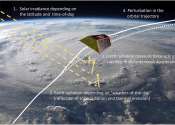Food is any substance, usually composed of carbohydrates, fats, proteins and water, that can be eaten or drunk by an animal or human for nutrition or pleasure. Items considered food may be sourced from plants, animals or other categories such as fungus or fermented products like alcohol. Although many human cultures sought food items through hunting and gathering, today most cultures use farming, ranching, and fishing, with hunting, foraging and other methods of a local nature included but playing a minor role.
Most traditions have a recognizable cuisine, a specific set of cooking traditions, preferences, and practices, the study of which is known as gastronomy. Many cultures have diversified their foods by means of preparation, cooking methods and manufacturing. This also includes a complex food trade which helps the cultures to economically survive by-way-of food, not just by consumption.
Many cultures study the dietary analysis of food habits. While humans are omnivores, religion and social constructs such as morality often affect which foods they will consume. Food safety is also a concern with foodborne illness claiming many lives each year. In many languages, food is often used metaphorically or figuratively, as in "food for thought".









